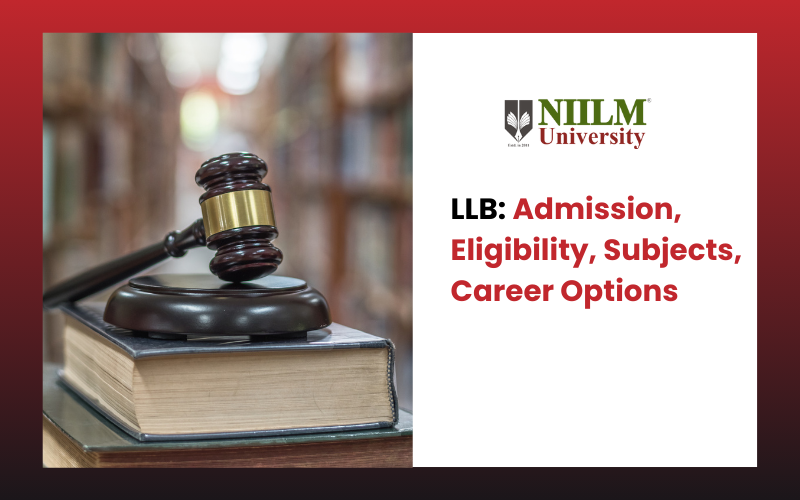Admission Enquiry

With an LLB degree, you may successfully navigate the admission procedures, eligibility requirements, course content, and variety of employment opportunities in the legal area.
Starting an LLB program means stepping out in the complex world of law, where every step reveals a new set of chances and difficulties. Bachelor of Laws, or Bachelor of Legislative Laws, is the full version of LLB. The three-year LLB program gives students a thorough understanding of a variety of legal topics. Courses like Contract Law, Criminal Law, Civil Law, Property Law, Corporate Law, are included in the LLB curriculum. We explore all aspects of LLB education in this thorough guide, providing information on its admissions procedure, qualifying requirements, range of subjects, and bright futures. Join us as we explore the rewarding path of obtaining an LLB degree and learn about the variety of opportunities it offers in the variable legal profession, from the fundamental ideas to the practical applications.
A bachelor's degree program in law, or LLB for short, offers a thorough understanding of legal systems and ideas. It gives students the tools they need to effectively study, interpret, and apply laws, preparing them for careers in law and related professions. Many legal topics, such as criminal law, contract law, constitutional law, and more, are often covered in LLB programs. Graduates of LLB degrees can work as consultants, attorneys, or in a variety of other legal capacities.
LLB degrees come in various types, catering to different interests and career goals:
Traditional LLB: This three-year undergraduate curriculum is typical and focuses on foundational legal studies.
Integrated LLB Programs: These programs offer innovative educational opportunities by fusing law with other academic fields including the social sciences, business administration, or the arts.
Dual Degree Programs: These programs, which provide the LLB plus additional degrees such as an MBA or an LLM (Master of Laws) concurrently, improve professional possibilities and versatility.
Online LLB Programs: Providing flexibility for remote learning, these programs are suitable for working professionals or those with time constraints.
Expand Legal Knowledge: LLB programs provide a comprehensive understanding of legal principles, systems, and practices.
Develop Analytical Skills: Studying law enhances critical thinking, problem-solving, and analytical reasoning abilities.
Diverse Career Opportunities: An LLB opens doors to various career paths, including legal practice, corporate law, public service, and legal consultancy.
Versatile Skills: Legal education fosters skills such as communication, research, negotiation, and conflict resolution, applicable across industries and professions.
Eligibility Criteria
-Candidates must have completed their undergraduate education from a recognized university or educational institution.
-A minimal cumulative percentage in their undergraduate studies, usually between 45% and 50%, may be required by certain colleges.
-In some countries, there may be reservation criteria for certain categories such as SC/ST/OBC/EWS and physically handicapped candidates. Applicants must fulfill the reservation criteria specified by the institution
Entrance Exams
Exams are administered by different colleges and universities for admission to their LLB programs. These tests evaluate a candidate's aptitude, legal concept understanding, and logical reasoning. The Common Law Admission Test (CLAT), the All India Law admission Test (AILET), and the Law School Admission Test (LSAT) are a few examples of popular admission exams.
Application Procedure
After meeting the eligibility criteria and clearing the entrance exam, candidates need to complete the application process as per the guidelines provided by the respective institutions. This may involve submitting application forms, academic transcripts, letters of recommendation, and other required documents.
The following courses are usually included in the LLB program syllabus:
Constitutional Law: This subject focuses on the study of the constitution, its principles, structures, and the relationship between different branches of government.
Criminal Law: Criminal law deals with offenses against the state or society, and it covers topics such as homicide, theft, assault, and other crimes, as well as the principles of criminal liability.
Contract Law: Contract law covers the formation, interpretation, and enforcement of agreements between parties. It includes topics like offer and acceptance, consideration, and contractual remedies.
Tort Law: Tort law addresses civil wrongs that inflict damage or injury on another individual or their property. It includes topics such as negligence, defamation, and nuisance.
Property Law: Property law concerns the ownership, use, and transfer of real and personal property. It covers topics like land ownership, leases, easements, and intellectual property rights.
Administrative Law: This subject focuses on the laws and regulations governing government agencies and their interactions with citizens. It covers topics such as administrative procedures, judicial review, and the principles of administrative justice.
In conclusion,an LLB degree offers an outstanding foundation in legal theories and procedures, as well as adaptable abilities for a variety of professional routes. Graduates are prepared to maintain justice, make meaningful contributions to society, and negotiate complicated legal environments. Whether one chooses to enroll in a regular LLB program or pursues a specialty degree, the legal education path equips students for meaningful work in advocacy, governance, and the law. All things considered, obtaining an LLB degree enables people to significantly impact the welfare of society and the rule of law.
Q1. What is the duration of an LLB degree?
A1. Typically, an LLB degree spans three to five years, depending on the program.
Q2. Can LLB graduates practice law internationally?
A2. It depends on the country's regulations, but many LLB holders can practice globally.
Q3. What skills are essential for success in LLB?
A3. Critical thinking, communication, research, and problem-solving skills are crucial.
Q4. Are internships mandatory during LLB?
A4. While not always mandatory, internships provide practical exposure and are highly recommended.
Q5. How can I prepare for LLB entrance exams effectively?
A5. Effective preparation involves thorough study of legal concepts, regular practice, and mock tests.
Copyrights © 2024 NIILM UNIVERSITY. All rights reserved.